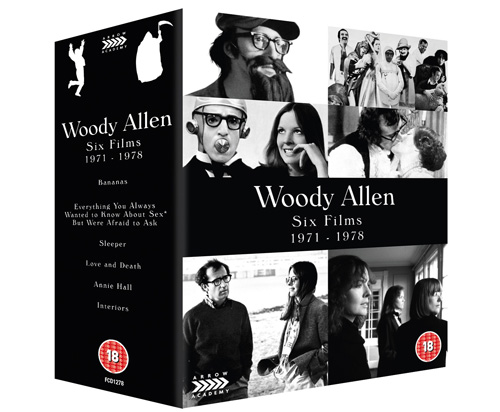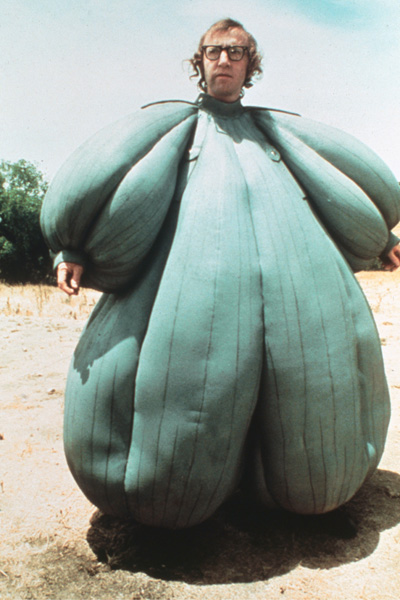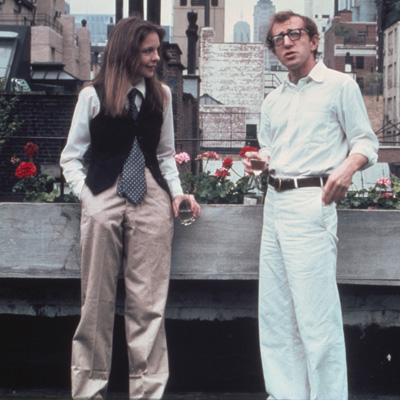Woody Allen: Six Films 1971 - 1978 | The early, funny films... and the first serious one

The latest updates, reviews and unmissable series to watch and more!
You are now subscribed
Your newsletter sign-up was successful
Want to add more newsletters?

ONCE A WEEK
What to Watch
Get all the latest TV news and movie reviews, streaming recommendations and exclusive interviews sent directly to your inbox each week in a newsletter put together by our experts just for you.

ONCE A WEEK
What to Watch Soapbox
Sign up to our new soap newsletter to get all the latest news, spoilers and gossip from the biggest US soaps sent straight to your inbox… so you never miss a moment of the drama!
Beloved by the aliens in Stardust Memories as well as by a sizeable portion of his fans, Woody Allen's early, funny films form the core of Arrow Academy's splendid Blu-ray box-set - Woody Allen: Six Films 1971- 78. Here we find Allen making a spectacle of his familiar comic persona, the hopelessly neurotic nebbish, giving full reign to his love of slapstick buffoonery and showing off his talent - now too little appreciated - for physical comedy. As the decade advances, however, this collection offers us the first glimpses of his serious side, too.
Bananas (1971), Allen's Latin American revolutionary spoof, was his first film after signing a deal with United Artists and followed his 1966 directorial debut, What's Up, Tiger Lily, a redubbed version of a Japanese spy movie; and his 1969 crime mockumentary Take the Money and Run. Acting opposite then wife Louise Lasser, he plays a hapless New Yorker called Fielding Mellish who becomes hilariously caught up in revolutionary turmoil after he impulsively takes off to join the rebel forces in the small South American state of San Marcos. Look out for a young Sylvester Stallone in the role of a thug who mugs Allen on the subway early in the film.
Everything You Always Wanted to Know About Sex*But Were Afraid to Ask (1972) is Allen's zany sex-education spoof inspired by Dr David Reuben's best-selling sex manual. The film's seven ribald sketches include tales of a court jester (Allen) who gets his hand caught in the queen's chastity belt and a doctor (played by Gene Wilder) who falls in love with a sheep.

Sleeper (1973) is the masterpiece of Allen's slapstick era, a gleeful sci-fi jape that sees his hypochondriac New Yorker, Miles Monroe, awaking after 200 years of cryogenic suspended animation to find himself in a bizarre totalitarian police state. The scenes in which Allen's hapless hero disguises himself as a domestic robot, ending up in the home of Diane Keaton's dilettante poet, Luna, are an absolute joy, featuring moments of silent comedy worthy of Buster Keaton. The jaunty Dixieland score by the Preservation Hall Jazz Band only adds to the fun.
Love and Death (1975) finds Allen again acting opposite Keaton but going back rather than forward in time. A gag-filled parody of Tolstoy's War and Peace, this manic period comedy casts Allen as a lowly Russian who becomes involved in a bizarre plot to assassinate Napoleon. Allen raids the back catalogue of Russian composer Sergei Prokofiev for the score and throws in scattershot references to the films of Ingmar Bergman with gags about the Grim Reaper and a direct steal from Persona.

Annie Hall (1977) sees Allen moving beyond the buffoonery of his previous films and venturing into more sophisticated comic realms, prepared to 'sacrifice some of the laughs for a story about human beings'. A romantic comedy charting the anxious love affair between Allen's neurotic New York comedian and Keaton's beautiful but scatter-brained singer, Annie Hall won four Academy Awards, including Best Film and Director, and turned Keaton into a style icon.
Interiors (1978) marks an even bigger departure for Allen. A sombre drama displaying the influence of Allen's adored Ingmar Bergman, the film follows three estranged sisters (Keaton, Kristin Griffith and Marybeth Hurt) as they finally confront their family's problems after their father (EG Marshall) leaves their mother (Geraldine Page) for another woman (the Oscar-nominated Maureen Stapleton). Gags are notably absent, but around the corner was Manhattan, the film that many still regard as Allen's masterpiece and which features in Arrow Academy's next Woody Allen collection, Woody Allen Six Films 1979 - 1985, due in December.
The latest updates, reviews and unmissable series to watch and more!
Woody Allen: Six Films 1971 - 1978 available on Blu-ray, courtesy of Arrow Academy. The collection includes a 100-page hardback featuring new and archive writing on all the films.
A film critic for over 25 years, Jason admits the job can occasionally be glamorous – sitting on a film festival jury in Portugal; hanging out with Baz Luhrmann at the Chateau Marmont; chatting with Sigourney Weaver about The Archers – but he mostly spends his time in darkened rooms watching films. He’s also written theatre and opera reviews, two guide books on Rome, and competed in a race for Yachting World, whose great wheeze it was to send a seasick film critic to write about his time on the ocean waves. But Jason is happiest on dry land with a classic screwball comedy or Hitchcock thriller.


